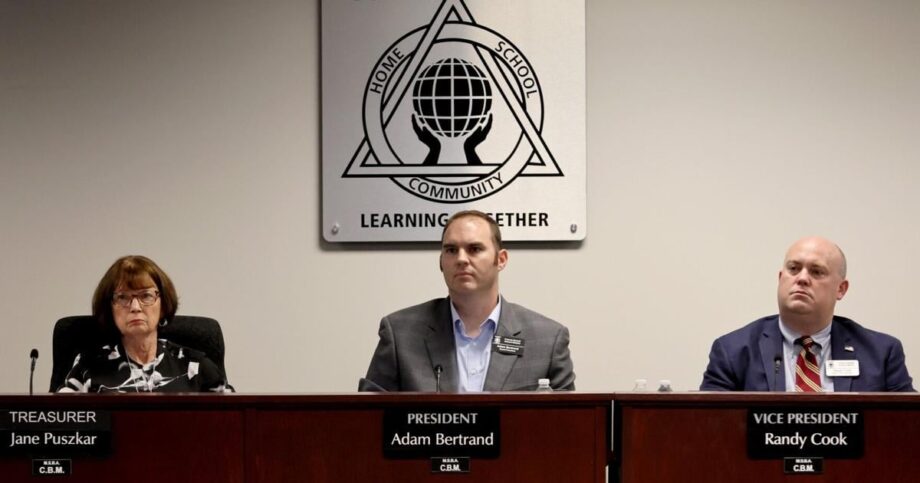Following a period of student protests, national attention, and community uproar, Francis Howell School District is looking into revised curricula for its Black history and Black literature courses.
The updated curricula largely resemble the previous versions that faced opposition from the conservative majority on the district’s school board last year. However, the district has removed the contentious social justice standards set by the Southern Poverty Law Center, a nonprofit organization specializing in civil rights litigation.
According to Jani Wilkens, a former teacher involved in developing the original Black literature curriculum, aside from the elimination of the standards, there doesn’t appear to be much of a difference in the new curricula.
The all-white Francis Howell School Board decided to revoke the social justice standards by a 5-2 vote in December, prompting swift student reactions, including protests and walkouts. Now, the board is expected to present the revised curricula at an upcoming meeting, with a final vote scheduled for March.
Supporters of removing the SPLC standards expressed concerns that they could introduce critical race theory into the curriculum, an academic concept that has drawn significant conservative scrutiny in recent years for examining how racism has influenced public policy and systems.
A conservative PAC backing the board majority, Francis Howell Families, stated on its website that eliminating these standards is a step toward eradicating ideological indoctrination from schools.
The new Black history curriculum has undergone significant changes compared to the previous version, while the Black literature curriculum has mostly stayed true to its original form. Both courses are elective offerings for juniors and seniors at Francis Howell’s high schools.
The Black literature course saw minor rewording of unit titles and descriptions, such as changing “The Power of Black Voices” to “The Impact of Black Voices.”
Conversely, the Black history course has seen a shift to a more straightforward, chronological approach to history, removing units on topics like the impact of laws and economic policies on Black wealth and historical struggles for equity. The focus now spans from African kingdoms’ origins to the present day.
The original course delved into various topics, including the legacy of Black cultural icons, the resilience of Black Americans, and the influence of Black history on local history, among others.
The course’s essential questions have also been revised to lead to more fact-based answers rather than philosophical discussions, emphasizing historical events like Plessy v. Ferguson and the impact of Jim Crow laws on Black Americans.
Lucas Lammers, the district’s director of curriculum and high schools, mentioned that the goal was to avoid using language that could be considered incendiary and provoke unnecessary controversy.
A team of seven individuals, including Black literature and history teachers, worked on the curricula revisions over two days. The process aimed to present a more objective and factual approach to the subjects.
Despite the changes, teachers continue to deliver the courses as originally structured, with the courses’ foundation partly built on standards from SPLC’s Teaching Tolerance project.
The Black history and literature courses were developed in the 2020-21 school year in response to student requests, with input from Dr. LaGarrett King, who provided minimal consultation on the courses. Critics raised concerns about the inclusion of critical race theory in the courses, but those involved in developing the curricula clarified King’s limited involvement.
Participants in the curriculum design process expressed their intention to spark compelling discussions within the courses and promote a deeper understanding of Black history and literature.
Parents had the opportunity to review the new curricula at an event where educators discussed changes to the Black history and literature courses, alongside 15 other courses undergoing review.
In an interview, Chance expressed his appreciation for the effort to maintain the core content of the classes, although he voiced concerns about the possibility of the courses not being advanced or voted on. Since the approval of the courses in 2021, only two out of the initial seven board members responsible remain part of the board. The board is currently predominantly composed of members affiliated with the conservative Francis Howell Families PAC.
Janet Stiglich, one of the two board members who opposed the removal of the original courses, mentioned that she found the new curricula and standards acceptable. However, she stated that she had no reservations regarding the previous curricula. Randy Cook, a newly elected board member, objected to the courses in 2021 and even submitted a 17-page letter urging the board to halt the courses until the curriculum was thoroughly revamped or completely removed.
Subsequently, Cook, now serving on the board, indicated a shift in perspective by stating, “I think Black history has promise now.” This signifies a change in his stance on the subject. The story has been revised to correct the misinformation regarding the number of students enrolled in Black literature this year.
Francis Howell Students Stage Walkout to Protest School Board Actions on Race and Gender Issues
Student Protest Against School Board Decisions
Francis Howell North High School senior Lauren Chance and her fellow students staged a walkout to voice their concerns regarding the recent actions taken by the Francis Howell School Board. The walkout, which occurred on Thursday, Jan. 18, 2024, aimed to protest the changes made by the board to the district’s courses on Black History and Black Literature. Additionally, the students were protesting the board’s decision to revoke a previously approved resolution against racism and discrimination.
Author: David Carson




